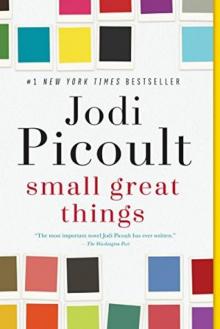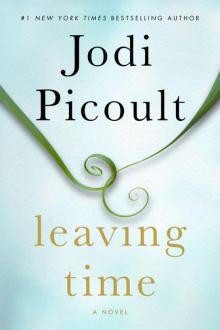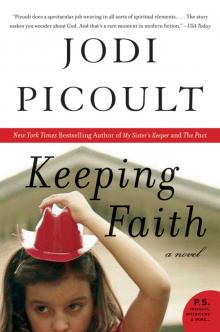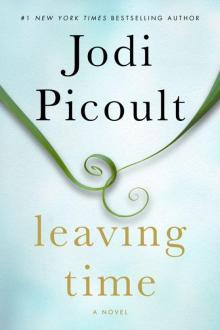- Home
- Jodi Picoult
Small Great Things Page 2
Small Great Things Read online
Page 2
I open the door to find Jessie dozing. The baby lies swaddled in the bassinet beside the bed; Jessie's husband is sprawled in a chair, snoring. Jessie stirs when I walk in, and I immediately put a finger to my lips. Quiet.
From my purse, I pull a compact mirror and a red lipstick.
Part of labor is conversation; it's the distraction that makes the pain ebb and it's the glue that bonds a nurse to her patient. What other situation can you think of where one medical professional spends up to twelve hours consulting with a single person? As a result, the connection we build with these women is fierce and fast. I know things about them, in a mere matter of hours, that their own closest friends don't always know: how she met her partner at a bar when she'd had too much to drink; how her father didn't live long enough to see this grandchild; how she worries about being a mom because she hated babysitting as a teenager. Last night, in the dragon hours of Jessie's labor, when she was teary and exhausted and snapping at her husband, I'd suggested that he go to the cafeteria to get a cup of coffee. As soon as he left, the air in the room was easier to breathe, and she fell back against those awful plastic pillows we have in the birthing pavilion. "What if this baby changes everything?" she sobbed. She confessed that she never went anywhere without her "game face" on, that her husband had never even seen her without mascara; and now here he was watching her body contort itself inside out, and how would he ever look at her the same way again?
Listen, I had told her. You let me worry about that.
I'd like to think my taking that one straw off her back was what gave her the strength to make it to transition.
It's funny. When I tell people I've been a labor and delivery nurse for more than twenty years, they're impressed by the fact that I have assisted in cesareans, that I can start an IV in my sleep, that I can tell the difference between a decel in the fetal heart rate that is normal and one that requires intervention. But for me, being an L & D nurse is all about knowing your patient, and what she needs. A back rub. An epidural. A little Maybelline.
Jessie glances at her husband, still dead to the world. Then she takes the lipstick from my hand. "Thank you," she whispers, and our eyes connect. I hold the mirror as she once again reinvents herself.
--
ON THURSDAYS, MY shift goes from 7:00 A.M. till 7:00 P.M. At Mercy-West Haven, during the day, we usually have two nurses on the birthing pavilion--three if we're swimming in human resources that day. As I walk through the pavilion, I note idly how many of our delivery suites are occupied--it's three, right now, a nice slow start to the day. Marie, the charge nurse, is already in the room where we have our morning meeting when I come inside, but Corinne--the second nurse on shift with me--is missing. "What's it going to be today?" Marie asks, as she flips through the morning paper.
"Flat tire," I reply. This guessing game is a routine: What excuse will Corinne use today for being late? It's a beautiful fall day in October, so she can't blame the weather.
"That was last week. I'm going with the flu."
"Speaking of which," I say. "How's Ella?" Marie's eight-year-old had caught the stomach bug that's been going around.
"Back in school today, thank God," Marie replies. "Now Dave's got it. I figure I have twenty-four hours before I'm down for the count." She looks up from the Regional section of the paper. "I saw Edison's name in here again," she says.
My son has made the Highest Honors list for every semester of his high school career. But just like I tell him, that's no reason to boast. "There are a lot of bright kids in this town," I demur.
"Still," Marie says. "For a boy like Edison to be so successful...well. You should be proud, is all. I can only hope Ella turns out to be that good a student."
A boy like Edison. I know what she is saying, even if she's careful not to spell it out. There are not many Black kids in the high school, and as far as I know, Edison is the only one on the Highest Honors list. Comments like this feel like paper cuts, but I've worked with Marie for over ten years now, so I try to ignore the sting. I know she doesn't really mean anything by it. She's a friend, after all--she came to my house with her family for Easter supper last year, along with some of the other nurses, and we've gone out for cocktails or movie nights and once a girls' weekend at a spa. Still, Marie has no idea how often I have to just take a deep breath, and move on. White people don't mean half the offensive things that come out of their mouths, and so I try not to let myself get rubbed the wrong way.
"Maybe you should hope that Ella makes it through the school day without going to the nurse's office again," I reply, and Marie laughs.
"You're right. First things first."
Corinne explodes into the room. "Sorry I'm late," she says, and Marie and I exchange a look. Corinne's fifteen years younger than I am, and there's always some emergency--a carburetor that's dead, a fight with her boyfriend, a crash on 95N. Corinne is one of those people for whom life is just the space between crises. She takes off her coat and manages to knock over a potted plant that died months ago, which no one has bothered to replace. "Dammit," she mutters, righting the pot and sweeping the soil back inside. She dusts off her palms on her scrubs, and then sits down with her hands folded. "I'm really sorry, Marie. The stupid tire I replaced last week has a leak or something; I had to drive here the whole way going thirty."
Marie reaches into her pocket and pulls out a dollar, which she flicks across the table at me. I laugh.
"All right," Marie says. "Floor report. Room two is a couplet. Jessica Myers, G one P one at forty weeks and two days. She had a vaginal delivery this morning at three A.M., uncomplicated, without pain meds. Baby girl is breast-feeding well; she's peed but hasn't pooped yet."
"I'll take her," Corinne and I say in unison.
Everyone wants the patient who's already delivered; it's the easier job. "I had her during active labor," I point out.
"Right," Marie says. "Ruth, she's yours." She pushes her reading glasses up on her nose. "Room three is Thea McVaughn, G one P zero at forty-one weeks and three days, she's in active labor at four centimeters dilated, membranes intact. Fetal heart rate tracing looks good on the monitor, the baby's active. She's requested an epidural and her IV fluid bolus is infusing."
"Has Anesthesia been paged?" Corinne asks.
"Yes."
"I've got her."
We only take one active labor patient at a time, if we can help it, which means that the third patient--the last one this morning--will be mine. "Room five is a recovery. Brittany Bauer is a G one P one at thirty-nine weeks and one day; had an epidural and a vaginal delivery at five-thirty A.M. Baby's a boy; they want a circ. Mom was a GDM A one; the baby is on Q three hour blood sugars for twenty-four hours. The mom really wants to breast-feed. They're still skin to skin."
A recovery is still a lot of work--a one-to-one nurse-patient relationship. True, the labor's finished, but there is still tidying up to be done, a physical assessment of the newborn, and a stack of paperwork. "Got it," I say, and I push away from the table to go find Lucille, the night nurse, who was with Brittany during the delivery.
She finds me first, in the staff restroom, washing my hands. "Tag, you're it," she says, handing me Brittany Bauer's file. "Twenty-six-year-old G one, now P one, delivered vaginally this morning at five-thirty over an intact perineum. She's O positive, rubella immune, Hep B and HIV negative, GBS negative. Gestational diabetic, diet controlled, otherwise uncomplicated. She still has an IV in her left forearm. I DC'd the epidural, but she hasn't been out of bed yet, so ask her if she has to get up and pee. Her bleeding's been good, her fundus is firm at U."
I open the file and scan the notes, committing the details to memory. "Davis," I read. "That's the baby?"
"Yeah. His vital signs have been normal, but his one-hour blood sugar was forty, so we've got him trying to nurse. He's done a little bit on each side, but he's kind of spitty and sleepy and he hasn't done a whole lot of eating."
"Did he get his eyes and thighs?"
&n
bsp; "Yeah, and he's peed, but hasn't pooped. I haven't done the bath or the newborn assessment yet."
"No problem," I say. "Is that it?"
"The dad's name is Turk," Lucille replies, hesitating. "There's something just a little...off about him."
"Like Creeper Dad?" I ask. Last year, we had a father who was flirting with the nursing student in the room during his wife's delivery. When she wound up having a C-section, instead of standing behind the drape near his wife's head, he strolled across the OR and said to the nursing student, Is it hot in here, or is it just you?
"Not like that," Lucille says. "He's appropriate with the mom. He's just...sketchy. I can't put my finger on it."
I've always thought that if I wasn't an L & D nurse, I'd make a great fake psychic. We are skilled at reading our patients so that we know what they need moments before they realize it. And we are also gifted when it comes to sensing strange vibes. Just last month my radar went off when a mentally challenged patient came in with an older Ukrainian woman who had befriended her at the grocery store where she worked. There was something weird about the dynamic between them, and I followed my hunch and called the police. Turned out the Ukrainian woman had served time in Kentucky for stealing the baby of a woman with Down syndrome.
So as I walk into Brittany Bauer's room for the first time, I am not worried. I'm thinking: I've got this.
I knock softly and push open the door. "I'm Ruth," I say. "I'm going to be your nurse today." I walk right up to Brittany, and smile down at the baby cradled in her arms. "Isn't he a sweetie! What's his name?" I ask, although I already know. It's a means to start a conversation, to connect with the patient.
Brittany doesn't answer. She looks at her husband, a hulking guy who's sitting on the edge of his chair. He's got military-short hair and he's bouncing the heel of one boot like he can't quite stay still. I get what Lucille saw in him. Turk Bauer makes me think of a power line that's snapped during a storm, and lies across the road just waiting for something to brush against it so it can shoot sparks.
It doesn't matter if you're shy or modest--nobody who's just had a baby stays quiet for long. They want to share this life-changing moment. They want to relive the labor, the birth, the beauty of their baby. But Brittany, well, it's almost like she needs his permission to speak. Domestic abuse? I wonder.
"Davis," she chokes out. "His name is Davis."
"Well, hello, Davis," I murmur, moving closer to the bed. "Would you mind if I take a listen to his heart and lungs and check his temperature?"
Her arms clamp tighter on the newborn, pulling him closer.
"I can do it right here," I say. "You don't have to let go of him."
You have to cut a new parent a little bit of slack, especially one who's already been told her baby's blood sugar is too low. So I tuck the thermometer under Davis's armpit, and get a normal reading. I look at the whorls of his hair--a patch of white can signify hearing loss; an alternating hair pattern can flag metabolic issues. I press my stethoscope against the baby's back, listening to his lungs. I slide my hand between him and his mother, listening to his heart.
Whoosh.
It's so faint that I think it's a mistake.
I listen again, trying to make sure it wasn't a fluke, but that slight whir is there behind the backbeat of the pulse.
Turk stands up so that he is towering over me; he folds his arms.
Nerves look different on fathers. They get combative, sometimes. As if they could bluster away whatever's wrong.
"I hear a very slight murmur," I say delicately. "But it could be nothing. This early, there are still parts of the heart that are developing. Even if it is a murmur, it could disappear in a few days. Still, I'll make a note of it; I'll have the pediatrician take a listen." While I'm talking, trying to be as calm as possible, I do another blood sugar. It's an Accu-Chek, which means we get instant results--and this time, he's at fifty-two. "Now, this is great news," I say, trying to give the Bauers something positive to hold on to. "His sugar is much better." I walk to the sink and run warm water, fill a plastic bowl, and set it on the warmer. "Davis is definitely perking up, and he'll probably start eating really soon. Why don't I get him cleaned up, and fire him up a little bit, and we can try nursing again?"
I reach down and scoop the baby up. Turning my back to the parents, I place Davis on the warmer and begin my exam. I can hear Brittany and Turk whispering fiercely as I check the fontanels on the baby's head for the suture lines, to make sure the bones aren't overriding each other. The parents are worried, and that's normal. A lot of patients don't like to take the nurse's opinion on any medical issue; they need to hear it from the doctor to believe it--even though L & D nurses are often the ones who first notice a quirk or a symptom. Their pediatrician is Atkins; I will page her after I'm done with the exam, and have her listen to the baby's heart.
But right now, my attention is on Davis. I look for facial bruising, hematoma, or abnormal shaping of the skull. I check the palmar creases in his tiny hands, and the set of his ears relative to his eyes. I measure the circumference of his head and the length of his squirming body. I check for clefts in the mouth and the ears. I palpate the clavicles and put my pinkie in his mouth to check his sucking reflex. I study the rise and fall of the tiny bellows of his chest, to make sure his breathing isn't labored. Press his belly to make sure it's soft, check his fingers and toes, scan for rashes or lesions or birthmarks. I make sure his testicles have descended and scan for hypospadias, making sure that the urethra is where it's supposed to be. Then I gently turn him over and scan the base of the spine for dimples or hair tufts or any other indicator of neural tube defect.
I realize that the whispering behind me has stopped. But instead of feeling more comfortable, it feels ominous. What do they think I'm doing wrong?
By the time I flip him back over, Davis's eyes are starting to drift shut. Babies usually get sleepy a couple of hours after delivery, which is one reason to do the bath now--it will wake him up long enough to try to feed again. There is a stack of wipes on the warmer; with practiced, sure strokes I dip one into the warm water and wipe the baby down from head to toe. Then I diaper him, swiftly wrap him up in a blanket like a burrito, and rinse his hair under the sink with some Johnson's baby shampoo. The last thing I do is put an ID band on him that will match the ones his parents have, and fasten a tiny electronic security bracelet on his ankle, which will set off an alarm if the baby gets too close to any of the exits.
I can feel the parents' eyes, hot on my back. I turn, a smile fastened on my face. "There," I say, handing the infant to Brittany again. "Clean as a whistle. Now, let's see if we can get him to nurse."
I reach down to help position the baby, but Brittany flinches.
"Get away from her," Turk Bauer says. "I want to talk to your boss."
They are the first words he has spoken to me in the twenty minutes I've been in this room with him and his family, and they carry an undercurrent of discontent. I'm pretty sure he doesn't want to tell Marie what a stellar job I've done. But I nod tightly and step out of the room, replaying every word and gesture I have made since introducing myself to Brittany Bauer. I walk to the nurses' desk and find Marie filling out a chart. "We've got a problem in Five," I say, trying to keep my voice even. "The father wants to see you."
"What happened?" Marie asks.
"Absolutely nothing," I reply, and I know it's true. I'm a good nurse. Sometimes a great one. I took care of that infant the way I would have taken care of any newborn on this pavilion. "I told them I heard what sounded like a murmur, and that I'd contact the pediatrician. And I bathed the baby and did his exam."
I must be doing a pretty awful job of hiding my feelings, though, because Marie looks at me sympathetically. "Maybe they're worried about the baby's heart," she says.
I am just a step behind her as we walk inside, so I can clearly see the relief on the faces of the parents when they see Marie. "I understand that you wanted to talk to me, Mr. Bauer?" sh
e says.
"That nurse," Turk says. "I don't want her touching my son again."
I can feel heat spreading from the collar of my scrubs up into my scalp. No one likes to be called out in front of her supervisor.
Marie draws herself upright, her spine stiffening. "I can assure you that Ruth is one of the best nurses we have, Mr. Bauer. If there's a formal complaint--"
"I don't want her or anyone who looks like her touching my son," the father interrupts, and he folds his arms across his chest. He's pushed up his sleeves while I was out of the room. Running from wrist to elbow on one arm is the tattoo of a Confederate flag.
Marie stops talking.
For a moment, I honestly don't understand. And then it hits me with the force of a blow: they don't have a problem with what I've done.
Just with who I am.
THE FIRST NIGGER I EVER met killed my older brother. I sat between my parents in a Vermont courtroom, wearing a stiff-collared shirt choking me, while men in suits argued and pointed at diagrams of cars and tire skids. I was eleven and Tanner sixteen. He'd just got his driver's license two months before. To celebrate, my mother baked him a cake decorated with a Fruit Roll-Up highway and one of my old Matchbox cars. The guy who killed him was from Massachusetts and was older than my father. His skin was darker than the wood of the witness box, and his teeth were nearly electric by contrast. I couldn't stop staring.
The jury couldn't reach a verdict--hung, they called it--and so this man was free to go. My mother completely lost it, shrieking, babbling about her baby and justice. The murderer shook hands with his lawyer and then turned around, walking toward us, so that we were only separated by a railing. "Mrs. Bauer," he said. "I am so sorry for your loss."

 Small Great Things
Small Great Things Leaving Time
Leaving Time Nineteen Minutes
Nineteen Minutes Larger Than Life
Larger Than Life Perfect Match
Perfect Match My Sister's Keeper
My Sister's Keeper The Pact
The Pact Handle With Care
Handle With Care Songs of the Humpback Whale
Songs of the Humpback Whale Mermaid
Mermaid The Tenth Circle
The Tenth Circle The Color War
The Color War Leaving Home: Short Pieces
Leaving Home: Short Pieces House Rules
House Rules Lone Wolf
Lone Wolf The Storyteller
The Storyteller The Book of Two Ways
The Book of Two Ways Shine
Shine Off the Page
Off the Page Sing You Home
Sing You Home Second Glance: A Novel
Second Glance: A Novel Mercy
Mercy Vanishing Acts
Vanishing Acts Between the Lines
Between the Lines Plain Truth
Plain Truth Salem Falls
Salem Falls Keeping Faith
Keeping Faith Harvesting the Heart
Harvesting the Heart Change of Heart
Change of Heart Where There's Smoke
Where There's Smoke Leaving Time: A Novel
Leaving Time: A Novel Over the Moon
Over the Moon House Rules: A Novel
House Rules: A Novel The Jodi Picoult Collection #2
The Jodi Picoult Collection #2 Leaving Home: Short Pieces (Kindle Single)
Leaving Home: Short Pieces (Kindle Single) My Sister's Keeper: A Novel
My Sister's Keeper: A Novel![Mermaid [Kindle in Motion] (Kindle Single) Read online](http://i1.bookreadfree.com/i1/04/03/mermaid_kindle_in_motion_kindle_single_preview.jpg) Mermaid [Kindle in Motion] (Kindle Single)
Mermaid [Kindle in Motion] (Kindle Single) The Jodi Picoult Collection #4
The Jodi Picoult Collection #4 Sing You Home: A Novel
Sing You Home: A Novel The Jodi Picoult Collection
The Jodi Picoult Collection Lone Wolf A Novel
Lone Wolf A Novel Second Glance
Second Glance Larger Than Life (Novella)
Larger Than Life (Novella) The Jodi Picoult Collection #3
The Jodi Picoult Collection #3